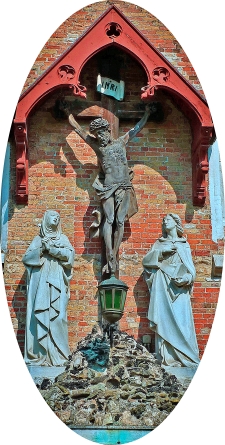But Peter denied it again. A little later some of the other bystanders confronted Peter and said, “You must be one of them, because you are a Galilean.” Peter swore, “A curse on me if I’m lying—I don’t know this man you’re talking about!” [Mark 14 (NLT)]
 Described as a “preaching genius…like no other preacher you have ever heard,” the late Rev. Fred Craddock was well-known for including stories in his sermons. He told one that took place during the early 60s in a diner in the deep South. Although the white Craddock sat in a booth and was served with courtesy and consideration, he silently watched the diner’s manager treat a Black man at the counter with rudeness, disdain, and open contempt. Although offended by the man’s racist behavior, Craddock remained silent. It was when he walked out of the diner after finishing his meal that the preacher heard a rooster crow. A signal of his betrayal, the crowing told the preacher that, by ignoring one of the “least of these”, he’d ignored Jesus! His silence was as much a betrayal of the Lord as were Peter’s denials!
Described as a “preaching genius…like no other preacher you have ever heard,” the late Rev. Fred Craddock was well-known for including stories in his sermons. He told one that took place during the early 60s in a diner in the deep South. Although the white Craddock sat in a booth and was served with courtesy and consideration, he silently watched the diner’s manager treat a Black man at the counter with rudeness, disdain, and open contempt. Although offended by the man’s racist behavior, Craddock remained silent. It was when he walked out of the diner after finishing his meal that the preacher heard a rooster crow. A signal of his betrayal, the crowing told the preacher that, by ignoring one of the “least of these”, he’d ignored Jesus! His silence was as much a betrayal of the Lord as were Peter’s denials!
Of course, to understand the impact of Craddock’s story on him and those who heard him tell it, you must be familiar with the story of Peter and his denial of Jesus. After finishing what would be known as the “Last Supper,” Jesus and the disciples went out to the Mount of Olives. When Jesus predicted that all the disciples would desert Him that night, Peter and the others protested saying they’d never deny Him. Outraged at the thought of denying the Lord, Peter insisted, “Even if I must die with you, I will not deny you!” Jesus, however, told the overconfident disciple that he would, indeed, deny knowing the Lord three times before the rooster crowed. Within a few hours, the man who claimed a willingness to join Jesus in prison and death denied knowing Jesus three times before the rooster announced the break of day with his crow.
The stories of Peter and Fred Craddock remind us that our faith is more vulnerable than we think. While I’ve never heard an actual rooster crow after denying the Lord, like those men, I’ve denied Jesus every time I’ve ignored His face in the faces of God’s children. While we may not have denied knowing Jesus as did Peter, like Craddock, we’ve denied Him when, like the goats in Jesus’ parable, we fail to be His disciples. We deny following the Galilean whenever we fail to be the hands of Jesus and serve the needy, to be the voice of Jesus and speak for the disenfranchised, or be the feet of Jesus and walk the extra mile for our neighbor.
Although Scripture assures us of God’s provision, presence, and power, when push comes to shove, it’s hard to fully trust a God we don’t see and whose ways we can’t fully understand! That’s when Satan gets busy behind the scenes instilling doubt, cowardice, and shame into our hearts. Rather than trust God’s strength more than our own, we begin to fear failure, rejection, and involvement. Rather than hear His call and cede control to Him, we’re like the priest and Levite in the parable of the Good Samaritan—we turn a blind eye to the suffering and a deaf ear to their cries!
We are fallen people living in a fallen world and, at times, we will fail to be the people Jesus calls us to be. We will fail to see Jesus in our midst and the cock will crow! Nevertheless, we must never allow those failures to defeat us. Peter—the one who lied three times with his blatant denial of Jesus—did not remain a prisoner to his fear or shame. He became the Apostle who boldly spoke of Jesus to the high council and, despite the threats, continued to speak of Christ until he, like his Lord, was crucified! Craddock didn’t let his failure stop him either. He told his story and others like it and, thirty years later, the man who remained silent when he should have spoken was named one of the twelve most influential preachers in America. Neither man was defined by his failures and neither are we. In nature, goats can never become sheep but, in God’s kingdom, by the power of the Holy Spirit, they can!
All men will be Peters in their bragging tongue, and most men will be Peters in their base denial; but few men will be Peters in their quick repentance. [Owen Feltham]

 The email from my dentist asked, “Would you recommend us?” When I answered in the affirmative, I was hyperlinked to a site that added my five-star rating to that of other patients. The following day, I received a longer survey regarding my recent visit. Once done, it again asked if I would recommend his services and requested use of my name in an on-line testimonial. It’s clear that my dentist wants more than feedback; he wants the public approval of his patients. Although I like him, I like my privacy more, so I declined!
The email from my dentist asked, “Would you recommend us?” When I answered in the affirmative, I was hyperlinked to a site that added my five-star rating to that of other patients. The following day, I received a longer survey regarding my recent visit. Once done, it again asked if I would recommend his services and requested use of my name in an on-line testimonial. It’s clear that my dentist wants more than feedback; he wants the public approval of his patients. Although I like him, I like my privacy more, so I declined! Having quoted from Isaiah when proclaiming the Messiah’s arrival, we know John knew Isaiah’s prophecies. The Messiah would “bind up the brokenhearted [and] proclaim liberty to captives and freedom to prisoners,” [61:1] but, after spending more than a year confined to a dark cell, John had neither liberty nor freedom. It’s no wonder he doubted.
Having quoted from Isaiah when proclaiming the Messiah’s arrival, we know John knew Isaiah’s prophecies. The Messiah would “bind up the brokenhearted [and] proclaim liberty to captives and freedom to prisoners,” [61:1] but, after spending more than a year confined to a dark cell, John had neither liberty nor freedom. It’s no wonder he doubted. At the time, Herod Antipas was the Tetrarch of Galilee and Perea. While married to the daughter of Aretas IV, king of Nabatea, Antipas visited his half-brother, Herod Philip and his wife Herodias (who was the daughter of another half-brother, Herod Aristobulus) in Rome. While there, Antipas became enamored with his brother’s wife. After divorcing their spouses, he and Herodias married and lived in Herod’s palace with Herodias’ daughter Salome. Their divorces and marriage were politically explosive and religiously scandalous and John the Baptizer was outspoken in his condemnation of their incestuous sinful relationship. While marrying a niece wasn’t uncommon, Mosaic law prohibited marrying a brother’s wife except in what was called a “levirate marriage” when a brother died childless. Philip, however, was very much alive at the time! Both Herod Antipas’ reputation and his political security were threatened by John’s public condemnation of his marriage as well as his Messianic message.
At the time, Herod Antipas was the Tetrarch of Galilee and Perea. While married to the daughter of Aretas IV, king of Nabatea, Antipas visited his half-brother, Herod Philip and his wife Herodias (who was the daughter of another half-brother, Herod Aristobulus) in Rome. While there, Antipas became enamored with his brother’s wife. After divorcing their spouses, he and Herodias married and lived in Herod’s palace with Herodias’ daughter Salome. Their divorces and marriage were politically explosive and religiously scandalous and John the Baptizer was outspoken in his condemnation of their incestuous sinful relationship. While marrying a niece wasn’t uncommon, Mosaic law prohibited marrying a brother’s wife except in what was called a “levirate marriage” when a brother died childless. Philip, however, was very much alive at the time! Both Herod Antipas’ reputation and his political security were threatened by John’s public condemnation of his marriage as well as his Messianic message.
 After pointing out Jesus as the “Lamb of God,” some of John the Baptizer’s disciples left John to follow Jesus. Later, John’s remaining disciples reported that Jesus was baptizing (it actually was His disciples) and wanted to know whose purification ritual of baptism was valid. With many turning from John to Jesus, the Baptizer’s disciples were confused, concerned, and probably a little envious. Apparently, they forgot that John’s original mission was that of forerunner—the one who would prepare the way for the Messiah and point the way to the Lamb of God. Knowing that he wasn’t the bridegroom but only His friend, the Baptizer humbly affirmed his position by telling his disciples that Jesus must become more prominent while he became less and less important. J.C. Ryle likened the Baptizer’s role to that of a star growing paler and paler as the sun rises until the star completely disappears in the light of the sun. John clearly understood that he was to fade in the light of the Son.
After pointing out Jesus as the “Lamb of God,” some of John the Baptizer’s disciples left John to follow Jesus. Later, John’s remaining disciples reported that Jesus was baptizing (it actually was His disciples) and wanted to know whose purification ritual of baptism was valid. With many turning from John to Jesus, the Baptizer’s disciples were confused, concerned, and probably a little envious. Apparently, they forgot that John’s original mission was that of forerunner—the one who would prepare the way for the Messiah and point the way to the Lamb of God. Knowing that he wasn’t the bridegroom but only His friend, the Baptizer humbly affirmed his position by telling his disciples that Jesus must become more prominent while he became less and less important. J.C. Ryle likened the Baptizer’s role to that of a star growing paler and paler as the sun rises until the star completely disappears in the light of the sun. John clearly understood that he was to fade in the light of the Son.